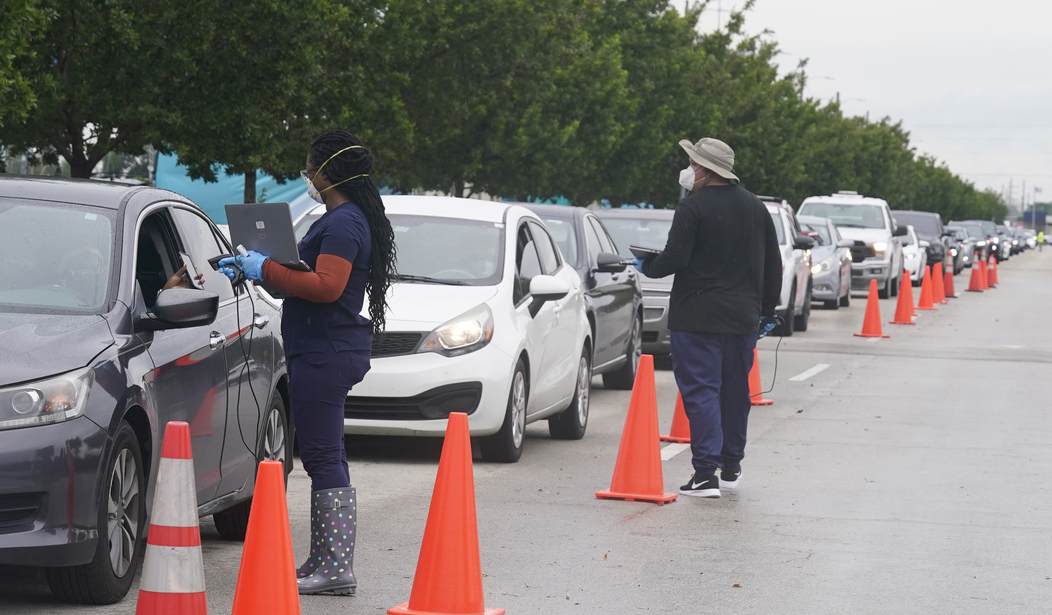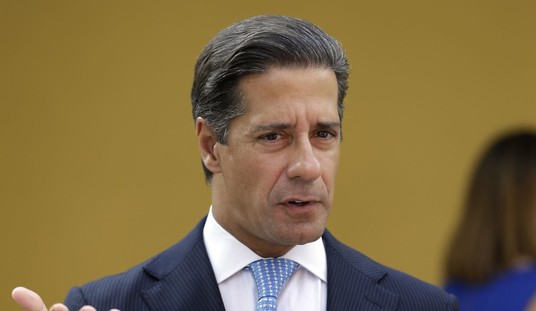If this is their way of trying to hide the bad COVID news from the public in order to help Democrats, they’re waaaaaay too late.
[T]hese counts only reflect what is reported by health authorities. They do not include most people who test themselves at home, or are infected without even knowing about it. Holidays and weekends also lead to lags in reported cases…
For that reason, The Associated Press has recently told its editors and reporters to avoid emphasizing case counts in stories about the disease. That means, for example, no more stories focused solely on a particular country or state setting a one-day record for number of cases, because that claim has become unreliable…
Hospitalization and death rates are considered by some to be a more reliable picture of COVID-19′s current impact on society. Yet even the usefulness of those numbers has been called into question in recent days. In many cases, hospitalizations are incidental: there are people being admitted for other reasons and are surprised to find they test positive for COVID, said Tanya Lewis, senior editor for health and medicine at Scientific American.
All of that is true is far as it goes. I’ve written similar things myself about the Omicron mega-surge. When tests are scarce and there’s a meaningful number of “COVID hospitalizations” that aren’t really due to COVID, the numbers tell us less than they used to.
But I still pay attention to them for the simple reason that they remain our best indicator of the magnitude of the surge, however imperfect they might be. It’s curious that a news agency would prefer to omit information entirely from its reports than include it with caveats about what the numbers aren’t able to capture.
The policy appears to be selectively enforced too:
An interesting decision by AP, who just two weeks ago was willing to slam – you guessed it! – Florida when cases there were spiking. pic.twitter.com/UvnWTpgIbo
— Drew Holden (@DrewHolden360) January 12, 2022
They’re not fooling anyone about the extent of the surge by leaving out the data. Even Americans who never read a newspaper or turn on the TV will have a sense of how bad the current wave is by the number of their own personal acquaintances who have come down with COVID lately. The endless pleas from doctors and nurses to the public that ERs are unmanageable right now and that everyone needs to do what they can to flatten the curve is another clue. You can’t hide the ball on what may turn out to be the most infectious virus anyone’s ever seen. All you can do is damage your own credibility by trying and failing to hide it.
How contagious is Omicron, by the way? So contagious that even COVID super-hawk Anthony Fauci is nudging Americans to face the reality that the variant will eventually “find” (although not necessarily infect) just about everyone.
Fauci didn't say Omicron will infect just about everybody, and WaPo should correct its story. He said that "some, maybe a lot" of vaxxed/boosted will get infected, not "just about everybody." Here's the transcript:https://t.co/Ekgv6WWymm https://t.co/MyVIDhsfCE pic.twitter.com/BBw0W44ncI
— Eric Columbus (@EricColumbus) January 12, 2022
If you’re boosted and exposed to the virus, you’ve got a shot — although not a great one — of fighting it off without symptoms. If you haven’t had three doses, prepare for an unpleasant few days. Charles Cooke noticed Fauci’s point and wondered if the ubiquity of Omicron and the inevitability of it “finding” all of us means it’s time to end all public restrictions. After all, there’s no public restriction that’s doing much of anything to limit transmission at this point. Vaccine passports, mask mandates, capacity limits — nothing’s going to keep Omicron out.
Inasmuch as vaccine mandates and passports compel people to take the one precaution that will meaningfully increase their odds of not needing hospital care if they’re infected, they’re helping to flatten the curve a bit. But even so, because the two-dose regimen requires five weeks to take full effect, the Omicron wave may well have receded by the time someone who gets their first dose today achieves full protection.
Actually … I take it back. There is one non-pharmaceutical intervention that appears to dramatically reduce the risk of transmission. But the CDC remains curiously unwilling to recommend it:
Rochelle Walensky, the head of the Centers for Disease Control and Prevention (CDC), said Wednesday that it does not plan to change its mask guidance to advise Americans to wear higher quality masks amid the omicron surge…
“We do encourage all Americans to wear a well-fitting mask to protect themselves and prevent the spread of COVID 19,” she said. “And the recommendation is not going to change.”…
“What I will say is the best mask that you can that you wear is the one that you will wear and the one you can keep on all day long that you can tolerate in public indoor settings and tolerate where you need to wear it,” the CDC director added.
There’s no dispute that a tightly fitted N95 is vastly superior at protecting the wearer from inhaling particles than the average cloth mask. Whatever’s driving the CDC to stand pat on its recommendation that all masks are equal — half-assed social psychology, probably — it ain’t science. And their complacency is going to mean that some people who’d otherwise have upgraded to an N95 and avoided infection during an exposure to Omicron will end up catching the virus instead.
Or am I wrong? At this stage of the pandemic, no one seems to be listening to the CDC anyway.
I’ll leave you with this. As most of the public gives up on taking precautions against a variant that seems to be inescapable, Democrats in the House are getting creative.
As #Omicron rages, Members breaking House rules by refusing to #maskup are threatening our dedicated staff and Members. Fines are not enough. I'm calling for unmasked Members to attend the floor and vote from the isolation boxes in the House Gallery. Read more⬇️ pic.twitter.com/UTDAJDlqiE
— Katherine Clark (@RepKClark) January 11, 2022








Join the conversation as a VIP Member